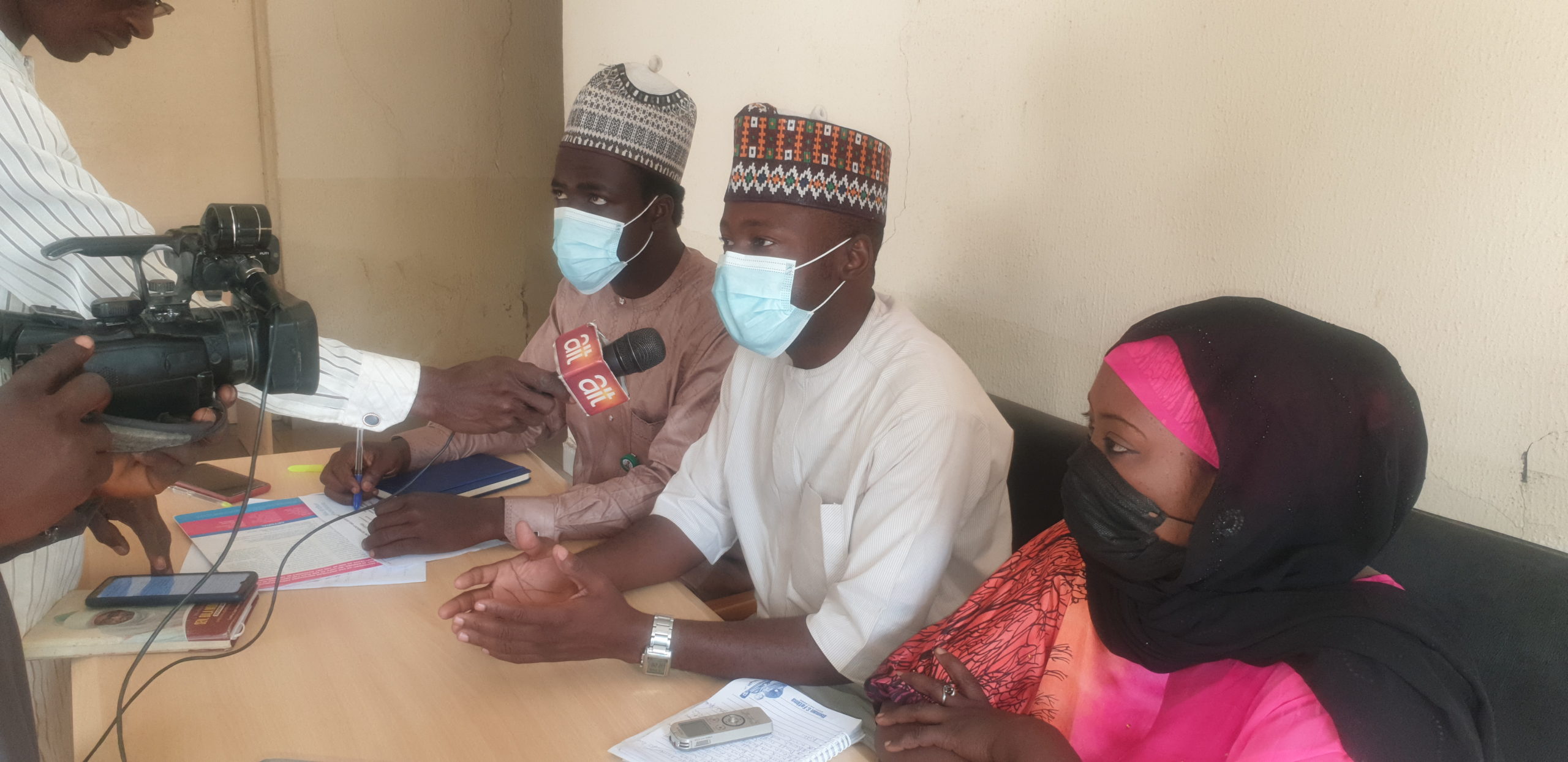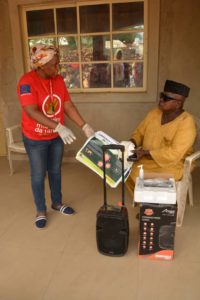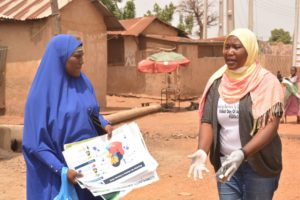
Text of Press Conference on the Need for People to Take COVID Vaccine Centre for Information Technology and Development (CITAD) 8 th December, 2021
Good afternoon ladies and gentlemen of the press, we want to thank you most sincerely for
coming to cover this briefing. At the Centre for Information Technology and Development
(CITAD) we implement the Public Education on COVID Vaccine project. The project which is
supported by MacArthur Foundation is aimed to educating and enlightening the public on the
role and relevance of COVID vaccine. We work with 18 partners across six northern states,
namely: Bauchi, Borno, Kano, Kaduna, Kogi and Plateau. We are therefore going to address you
on issues relating to vaccination.
COVID outbreak is no doubt one of the pandemics the world has witnessed recently. Deaths
have been recorded in towns and villages, movements have been restricted, lockdowns imposed,
gatherings banned, etc people have really felt the consequences of the pandemic greatly, these
measures were laudably taken to address the pandemic.
Therefore standing against COVID should not be the role of governments at different levels,
civil society or private sector-led initiatives, rather the larger members of the society have a
crucial role to play. Efforts no matter how carefully tailored cannot alone succeed in addressing
the virus if members of the society do not support and cooperate with the initiatives, taking the
vaccine is surely one way to prevent ourselves from the virus.
COVID Vaccine Administration Situation from States
The data we at CITAD gathered from researches and engagements conducted by our 18 partners
across six states of the north has given us a broader perspective on the hindrances and challenges
of the COVID vaccination in those states. The hindrances and challenges differ from state to
state as can be seen below.
For example in Borno state there are 87 vaccination spots across the 27 local governments of the
state. But the main challenge of getting as people as possible vaccinated are as follows:
1. Lack of COVID certificate seal or barcode in 70% of the vaccination spots
2. Nonpayment of COVID vaccine administrators
3. Misconception on vaccine amongst government officials
4. Lack of sufficient information on where and how to be vaccinated
The above problems are creating serious hindrances to COVID vaccine administration in the
state. As established by our partners, more than 70% of the vaccination centres had ran out of
seal to place on the vaccine certificates of the vaccinated people. We therefore appeal to Borno
state government to immediately access the seals for smooth vaccination exercise to take place in
the state. Another critical challenge is in the area of nonpayment of the health workers involved
in the vaccine administration. Lack of that motivation has further made some of the staff to be
completely absent at the vaccination spots or close before time. This situation has made people
who want to be vaccinated not to access the vaccine. There are also misconceptions and
conspiracy theories around the vaccine that some government officials in the state have which
has also been a serious problem to getting people vaccinated, this has not only demoralized many
people, but it has also reinforced their disbelief and rejection of the vaccine.
In Plateau state, while there is information on where and how people can get vaccinated, the
major hindrances are however stated as follows:
1. Fear of Future of Consequences of the Vaccine
2. Conspiracy Theories of Opinion Leaders
While there is information on vaccination spots in the state, the major challenge as found by our
partners in the state is the fear that many people have on the vaccine, believing that it has future
consequences on the people that accept the vaccine. Rumour circulating on the vaccine remains a
critical hindrance. To complement the earlier negative narrative, some opinion leaders in the
state hold strong negative views about the virus and its vaccination, that is a major problem to
getting more people accept the vaccine despite considerable information flow on accessing the
vaccine. We urge the state government to look into that and address those problems.
In Kogi state more people are accepting the vaccine and that is largely due to role of elites,
federal and state civil servants in accepting the vaccine. That has be an encouraging factor to
many people accepting the vaccine. For example 75 people were vaccinated in two days in
Adankolo Primary Health Centre Lokoja. However, that is not to say there are no challenges
regarding vaccination exercise in the state as people speculate that taking the vaccine makes one
sick.
In Kano state, findings indicate that teachers in Tsangaya schools reject the vaccine because
according to them their numerous problems have been left unattended to and unaddressed as
well. Some of them feel the vaccine is not as important as other critical problems they have. This
is a major hindrance to vaccinating not only the teachers but the hundreds of thousands of their
students. It is therefore recommended that authorities work closely with them to proffer solutions
to issues around them and get them vaccinated as they form a considerable number in the
population of Kano state.
Our Concerns
It is unfortunate that despite the difficult moment COVID has pushed people into, vaccination
against the virus in the country is still very low. Premium Times Newspaper reported on 4 th
December, 2021 that only 3% of Nigerians are vaccinated, this is disturbing at a time when
Omicron variant is surfacing.
What is happening in countries such as South Africa, United Kingdom, Czech, U.S.A,
Netherlands, Columbia, etc should serve as a lesson to Nigeria and Nigerians that COVID is not
gone yet. And with Omicron variant making waves we must urge that efforts to curb the spread
of the virus be taken more seriously.
Recommendations:
1. As a matter of urgency we appeal to all unvaccinated Nigerians to quickly go and take the
vaccine.
2. We urge stakeholders and opinion leaders in Plateau state to work together to address
misconception theories on COVID and its vaccination as well as enlighten the public on
the relevance of the vaccine.
3. We urge authorities in Borno state to ensure the provision of sufficient seals to the
vaccination spots and motivate vaccination staff by paying their allowances
4. We urge people to disregard fake narratives around the vaccine as the narratives were not
scientifically proven. Reputable health agencies have confirmed the efficiency of the
vaccine as such people should disregard the rumours
5. Health authorities in various states should prioritize information sharing on how and
where people can get the vaccine.
6. To this end we would like to strongly appeal to traditional and religious leaders, the
media, community associations and opinion leaders in the society to join us in the
campaign to enlighten people on the relevance of the vaccine and taking it.
7. We want traditional leaders to use their chain of leadership to emphasize the role of the
vaccine and taking it, we equally want religious leaders to sensitize their members and
followers in various fora on taking the vaccine.
8. We want to urge all and sundry in the society to corporate with authorities in their quest
to curbing the spread of the virus by adhering to all measures being put in place.
9. COVID is not over yet, therefore measures such as putting on face masks and avoiding
crowd or maintaining social distancing where necessary should still be observed.
10. If you are not vaccinated, quickly and get vaccinated!
Signed:
Hamza Ibrahim,
Project Manager,
Public Education Vaccine Project.
Centre for Information Technology and Development (CITAD).














